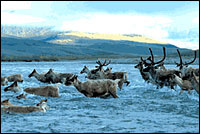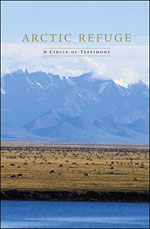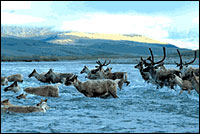First, the facts. The Arctic National Wildlife Refuge covers about 19 million acres in northeastern Alaska, almost all north of the Arctic Circle. It was created in 1980 by the Alaska National Interest Lands Conservation Act, which renamed and more than doubled the size of an existing wildlife range, designated about 8 million acres within the refuge as wilderness, and prohibited oil and gas production in the refuge unless authorized by Congress.

Caribou on the coastal plain.
Photo: Alaska Wilderness League.
The Arctic Refuge provides essential and unique habitat for more than 250 animal species, including polar bears, caribou, wolves, grizzly bears, muskoxen, wolverines, arctic foxes, and migratory birds from four continents. This country is home to the Gwich’in people, whose lives depend on caribou. The area eyed greedily by the oil and gas industry — the refuge’s 1.5 million-acre coastal plain — is vital to denning for polar bears, calving for caribou and muskoxen, and feeding for snow geese and more than 130 other bird species. Appropriately, the Gwich’in call the coastal plain, “where life begins.”
The Bush administration says that opening the refuge for oil and gas production will ease current energy shortages and reduce U.S. dependence on foreign oil. Again, the facts: The U.S. Geological Survey estimates that the refuge’s coastal plain is likely to contain 3.2 billion barrels of oil that are economically recoverable at today’s prices — roughly a six-month supply based on the current U.S. rate of consumption. According to calculations by the Natural Resources Defense Council, simply by increasing fuel efficiency for passenger vehicles and light trucks to 39 miles per gallon or by using better tires over the next 50 years, we could save many times more fuel than the refuge is likely to produce in the same time period. The industry claims that environmentally friendly oil and gas extraction is possible, but the U.S. Fish and Wildlife Service predicts it would lead to a litany of destructive impacts from miles of roads, pipelines, power plants, gravel pits, landfills, and seismic disturbances.

Arctic Refuge: A Circle
of Testimony
Compiled by Hank Lentfer
and Carolyn Servid
Milkweed Editions,
114 pages, 2001
Faced with this threat, Carolyn Servid and Hank Lentfer, longtime residents of Alaska, invited a group of writers, nearly 30 in all, to testify on behalf of the Arctic Refuge. This collection of impassioned literary essays and poems — published with private funds and available online — is being sent to every member of Congress. Among the contributors, many of whom live in Alaska, are Rick Bass, Barry Lopez, Sherry Simpson, Terry Tempest Williams, Mardy Murie, former Rep. John Seiberling (D-Ohio), former President Jimmy Carter, several members of the Gwich’in tribe, and wildlife biologists.
If I were the project’s publicist, I might lead with the title of Gwich’in writer Sarah James’s piece, “We Are the Ones Who Have Everything to Lose.” Then, I would cite Jimmy Carter’s call for “all members of Congress to stand in opposition to drilling in the Arctic Refuge” and “look beyond the benefits of short-term economic gain.” For those within the beltway to whom caribou calving has little meaning, I would recommend Bill McKibben’s piece, which succinctly outlines the folly of destroying pristine wilderness to foul the air and exacerbate global warming. Even Wendell Berry, who typically advocates staying home to mind one’s own backyard and questions the idea of protecting isolated wildernesses, says, “Hell, no” to drilling.
Will this literary endeavor sway the necessary hearts and minds? One can only hope it will help. The Bush administration should stand forewarned: This collection of eloquence is only the tip of the iceberg of public sentiment that could be unleashed to remind President Bush and his cohorts that the majority of Americans steadfastly oppose drilling in the Arctic Refuge.


